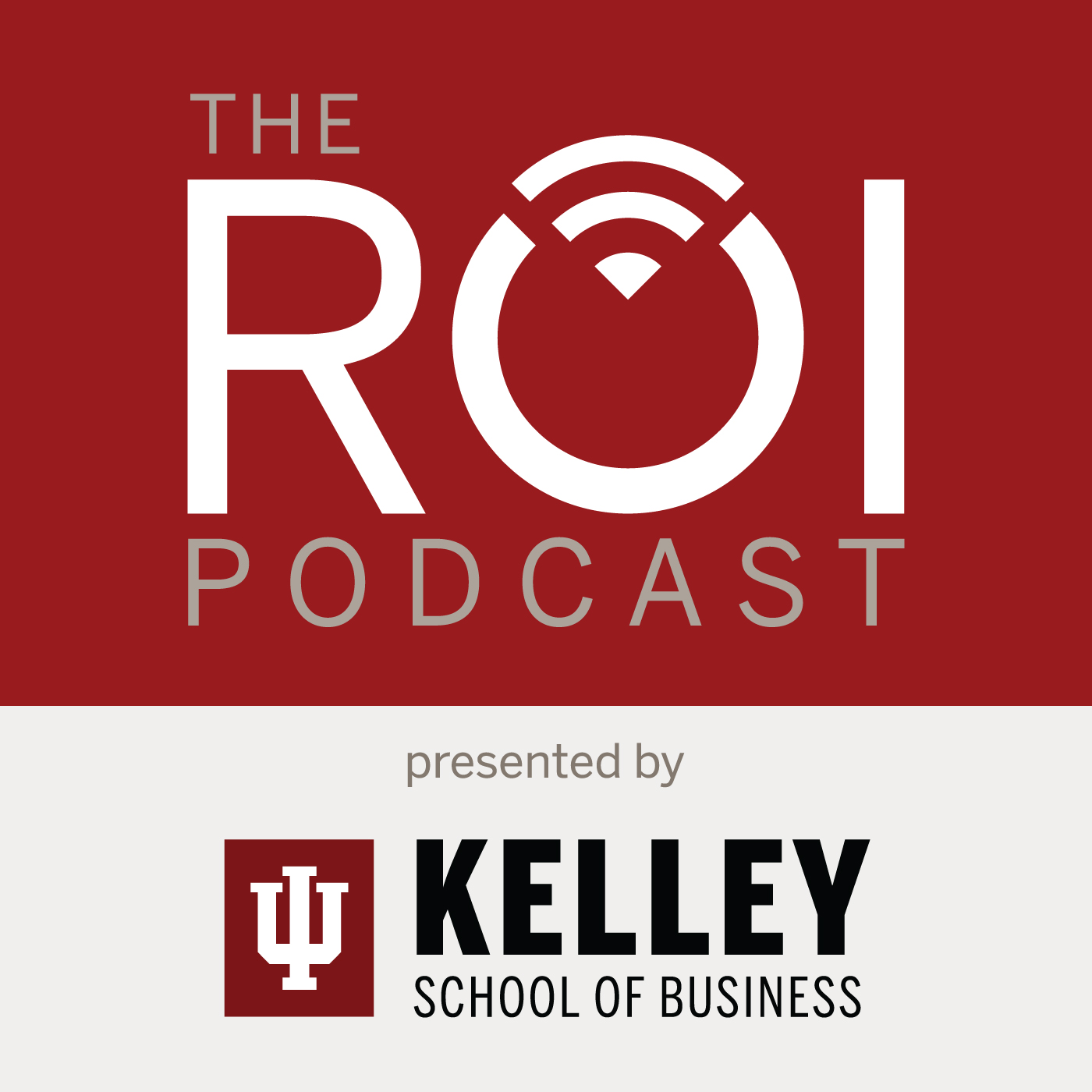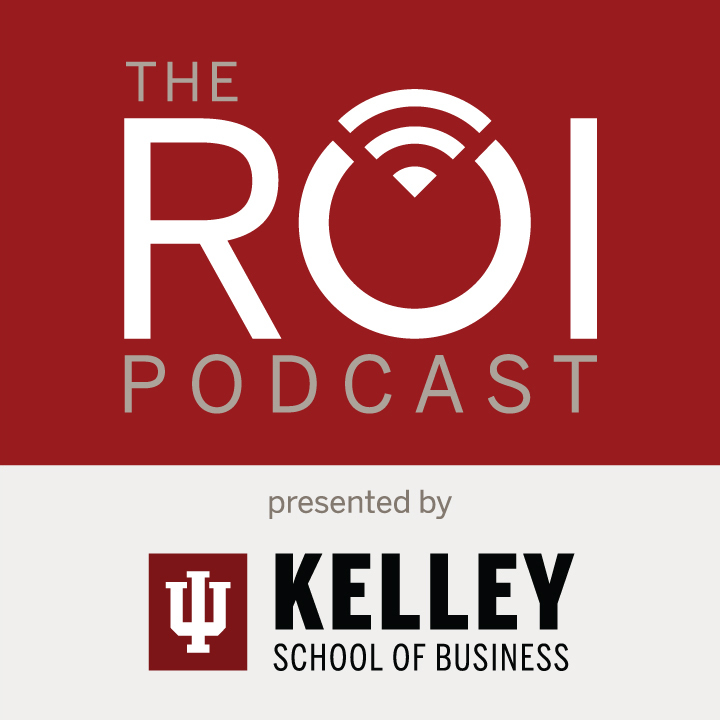
The ROI Podcast provides professionals from all industries with actionable insight from world-renowned faculty members at Indiana University's Kelley School of Business. Learn not only from award-winning faculty but business experts who are disrupting their respective industries. The ROI Podcast equips you and your organization with the knowledge to keep a competitive edge over the competition.
Episodes

Monday Jan 08, 2018
Monday Jan 08, 2018
Those who are invested in the stock market are looking into 2018 with optimism. GDP growth is up, profits continue to rise and the economy's in a good place. But what changes could impact the markets in the coming year? And are the tried and true investment strategies of the old days still relevant? We sat down with associate professor of finance Rob Neal to discuss these topics.
----
Do you have a question? Looking to get help on a business decision? Know a great guest for our show? Email roipod@iupui.edu so we can help your organization make better business decisions.
----
Ready to take your next step? Check out if a Kelley MBA is right for you: https://bit.ly/3m2G6D5
----
Show Notes:
Shane: Happy New Year to all of you – hopefully your 2018 has gotten off to an outstanding start! And now it’s the time to think about what this upcoming year has to bring – and how you can dominate it and accomplish your goals. With this being a new year, there brings new opportunities and challenges in business – none more pressing than the financial markets. So in this episode of The ROI Podcast – we’ll be talking outlooks for the markets – and how you can maximize your returns in the stock market.
(The ROI Podcast Music)
Shane: It’s a new year and a new episode of The ROI Podcast presented by the Kelley School of Business on the IUPUI Campus in downtown Indianapolis. I’m Shane Simmons and the associate dean of academic programs here at the Kelley School, Phil Powell is next to me. How’s it going, Phil?
Phil: (Response)
Shane: Today we’re taking a look at the 2018 financial markets – and also giving our listeners some tips when it comes to investing, especially when it comes to retirement.
Phil: You know, when we look at the financial markets and where they’re at and where they may be going, I think back to the mid-2000s where we had a massive segment of growth before the markets collapsed. According to Rob Neal, associate professor of finance at the Kelley School of business on the IUPUI campus, when looking at the markets there are certain factors we look at.
Rob: When we think about what drives the markets and stock prices, usually we focus on three factors: corporate earnings, interest rates, and measures of market ratios. When we look at the earnings part, what we saw was from roughly 2014-16, that three year period, earning growth is pretty much flat, save for the S&P 500. Now in 2017, it’s rebounded, it’s up about 10% for the calendar year so far, which is above its long-term average. Our forecast going forward for next year are slightly higher, about 11%, so that’s good news for a market forecast. On the interest-rate side, the current federal funds rate is sitting about 1.25% - the expectations going forward are that we’re going to see another interest rate increase 25 basis points in December, and probably another 2 or so in 2018. That’s going to take the interest rates up to about 2%, which are still relatively low, certainly on a historical basis.
Phil: And you heard Professor Neal mention earnings as one of those three factors that really drives the markets and stock prices. Recently, we just saw productivity growth rate over the last two quarters surpass 3 percent.
Shane: And for some of our listeners out there – define productivity growth rate.
Phil: (Defines Productivity Growth Rate)
Phil: So my questions to Professor Neal was this: Is productivity growth going to be one source that could drive extraordinary earnings growth?
Rob: Any time you can do a better job of utilizing resources to produce your products you’re earnings are going to benefit.
Rob: my hunch is if we’re successful on the corporate side of trying to keep our tax rates more inline with worldwide global averages, then it is going to have a net positive impact on productivity going forward. We’ve got some demographic changes that we are working against us in productivity and are probably scaling back our long-term productivity estimates, but from my perspective I see a lot of positive developments on the technology side. A lot of innovation going on. Internet of things developments. New censors being able to monitor workflow, and even being able to get traffic patterns to improve.
Rob: I think were on the cusp of a lot of potential innovation that’s going to have a positive impact.
Phil: So some of you out there listening may be thinking this is interesting and has a very positive outlook – but let’s not forget what happened to so many people during the crash of 2008 – losing thousands of dollars. Some may say the stock market is like the lottery or like gambling in Vegas. If you’re afraid to put your money in the stock market because of that – here’s what Professor Neal has to say.
Rob: It’s definitely NOT the same thing as going to Vegas. You might think about buying a lottery ticket. Alright, all of you listeners out there, don’t buy lottery tickets, please. Your payoff to a lottery ticket is about 50 cents on the dollar. Now if you want to blow your money, go to a casino. You can play the slot machines and your payoff there is going to be 90-95 cents on the dollar. Now if you keep on doing this, the probability that you’re going to be broke is essentially 100%. But it’s going to last a lot longer if you gamble in a casino versus doing it with a lottery ticket. Now in contrast, when we look at the equity markets, on average stock prices go up on an inflated-adjusted basis about 7 percent per year. So you’ve got that working for you. One of the big risks investors face, and we face it right now and you might think the market is expensive and you want to get out, but being out of the market long term is highly risky and it’s a guaranteed failure rate. So you’re never going to be able to grow your resources enough to do what you want to do in retirement or down the road.
Phil: And Professor Neal says one of the best financial decisions he made was during the crash of 2008.
Rob: One of the best investment decisions I made was during the financial crisis. I’m always getting calls from neighbors asking what do I do? The best investment decision I made was to do nothing. So I just stayed put. I rode it out, and for everyone else, you’ve got to understand that if you get to 7 percent annual rate of return, it’s not going to be without risk. There are going to be times when you are going to lose a bunch of money. But what you want to do is focus on where you are likely to be 30 years from now. 20 years from now. 40 years from now. And what’s the best plan for getting there?
Phil: And another tip, that may seem obvious but a lot of people still don’t do this – is contribute enough to your 401k that your employer can reach its maximum match contribution.
Rob: From a retirement perspective, this is something that everyone should do. If you have an employee match, be sure to contribute enough to get the maximum match from your employer. That’s free money and you’re never going to see a rate of return like you get on that investment. So that’s rule number one. Rule number two is thinking about an investment in an index fund, it doesn’t have to be U.S. funds, in fact, I would encourage a certain amount of global diversification. If you look at European markets they tend to look more attractive on a valuation basis than American markets do. But our historical rate of return on inflation-adjusted dollars is about 7 percent per year on the market.
(Closing Music)
Phil: Bottom line is the economy is looking pretty good next year, markets are looking good, there are always questions about it. But in terms of your investment strategy, put it in an index fund and just don’t do anything else.
Rob: put the money in, leave it. And hope for her best, based on the info we have, that’s probably the best strategy.
(The ROI Podcast Music)
Shane: So wrapping this up – it looks like going into 2018 we are in pretty good shape. And we’re looking at returns on equities to be positive, but maybe just below that 7 and a half percent average over the past 50 years…
Phil: (Response)
Shane: That’s going to do it for us. Thank you to professor Rob Neal for his insight. And for all of you listeners out there be sure to go to iTunes, Subscribe and Leave us A review – we’d love to get your feedback on the podcast. We’ll talk to you all next week!

Comments (0)
To leave or reply to comments, please download free Podbean or
No Comments
To leave or reply to comments,
please download free Podbean App.